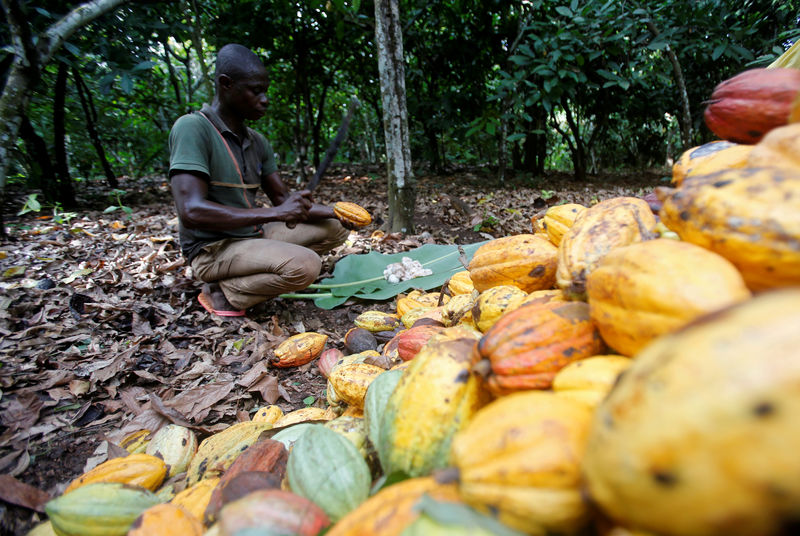By Ange Aboa and Maytaal Angel
ABIDJAN/LONDON (Reuters) - Ivory Coast and Ghana's threat to possibly halt the cocoa industry's ethical branding schemes poses a major risk to chocolate makers operating in Western markets where consumer demand for sustainably sourced products is rising.
The West African nations, which together produce more than 60% of the world's cocoa, said last week they will re-examine the schemes because chocolate makers have been slow to pay them a "living income" premium for their beans.
In a bid to ease pervasive farmer poverty, Ivory Coast and Ghana introduced a $400 a tonne living income differential (LID) in July on cocoa sales for the 2020/21 season. The move was a major overhaul in how global cocoa is priced.
They have since sold around 150,000 tonnes of 2020/21 cocoa, trade and government sources said, versus about 450,000 tonnes this time last year.
There are still some 2.35 million tonnes left to sell, but while the current marketing campaign is still in its early stages, Ivory Coast and Ghana need faster, large-volume sales to chocolate makers for the LID to work.
"The two countries have resolved to make the (LID) work whatever it takes," said a source at Cocobod, Ghana's cocoa regulator. He said this included halting sustainability schemes, used for ethical branding, within the next few weeks if chocolate makers don't comply.
Under pressure from Western consumers for ethically sourced products, chocolate makers such as Mars Wrigley, Mondelez (O:MDLZ), Barry Callebaut (S:BARN), Hershey's (N:HSY) and Nestle (S:NESN) have spent millions on sustainability schemes.
The programmes, which include audits from certifiers such as Fair Trade, are key to chocolate makers' branding, which could be hit if they are seen as hesitant to part with cash ear-marked to alleviate poverty.
"A few weeks ago, we started buying some quantities of cocoa for 2020/2021," said a spokesperson for Nestlé.
Hershey's said it times its purchases based on commercial needs but will comply with the LID, while Mondelez said it recognised the urgent need to improve farmer livelihoods, but added longer term, price premiums need to be directly linked to measures to eradicate poverty and climate change.
"We have not changed our buying approach in any way. As our approach takes us into the 2020/2021 crop, we are absolutely committed to buy with the LID," said a Mars spokesman.
Barry Callebaut declined to comment.
NAMED AND SHAMED
Ivory Coast and Ghana plan to use the LID income to guarantee farmers 70% of a $2,600 a tonne target price. If global prices rise above $2,900, LID proceeds will be placed in a fund that would guarantee farmers the target price when market prices fall.
For the scheme to work, the two nations need money upfront. They have already raised the guaranteed price they will pay farmers for this season's crop.
"(Chocolate makers) are going to be named and shamed soon. Customers will read that they don't support farmers, their certification schemes have been suspended, etc," said a senior cocoa trader.
Commodity traders act as middlemen - buying cocoa, selling it to chocolate makers, and making money on the spread. They usually buy in advance from producers and hold the risk on their books until chocolate makers step in.
Their margins have plunged in recent years however.
Because they are also unable to hedge the LID, they say chocolate makers who have committed to ethical sourcing need to take on some of the risk by bringing forward their purchases.
This would require a sourcing strategy overhaul for chocolate makers. Moreover, they fear that if they pay the LID now and their competitors don't, they could lose out if the LID is later scrapped.
"This (LID) could work if Ivory Coast and Ghana had the money to stockpile (excess supply) but they (don't) so most of us think the plan will have to be adapted or maybe withdrawn," said a cocoa industry source.
The source added that halting sustainability schemes would hurt farmers, not just chocolate makers.
About 500,000 tonnes of Ivory Coast and Ghana cocoa are certified per year, according to industry sources. The cocoa can fetch farmers a premium of up to $200 per tonne.
The cocoa industry's efforts to source sustainably have been around for nearly two decades, though little has changed on the ground for farmers, with poverty widespread and West African forest cover all but decimated.
